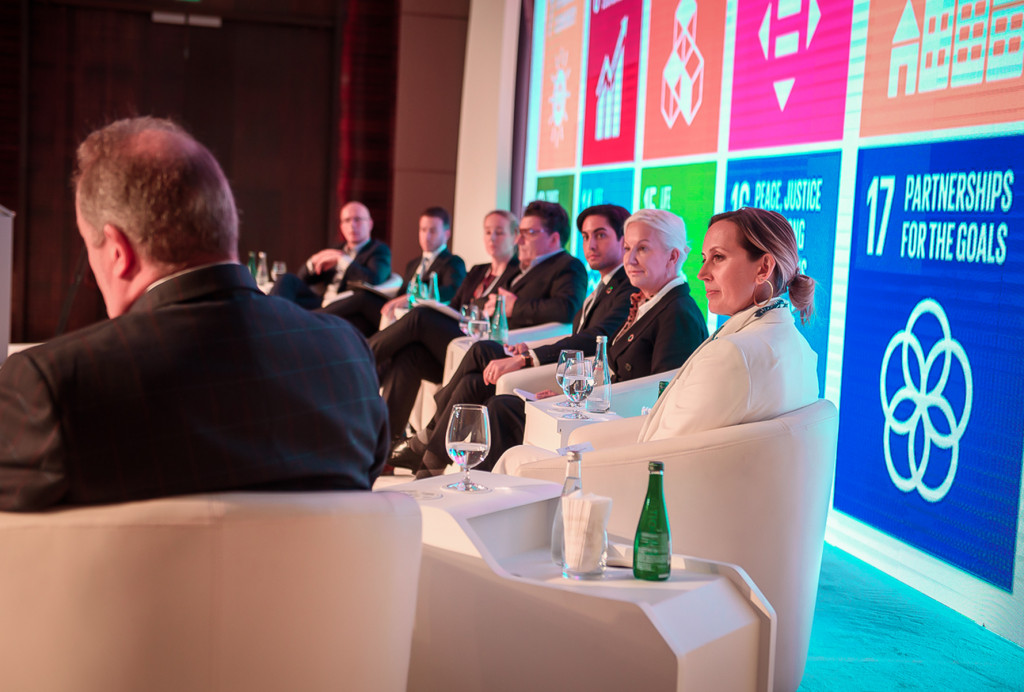
The World Jewellery Confederation’s Responsible Sourcing Commission in session at the 2019 CIBJO Congress in Manama, Bahrain.
ETHICS & SUSTAINABILITY
In 2006, the World Jewellery Confederation became the only organisation in the diamond, gemstone and jewellery sectors ever to receive official consultative status with the Economic and Social Council (ECOSOC) of the United Nations. Based on Article 71 of the UN Charter, the status enables it, on behalf of the international gemstone and jewellery industries, to advance the programmes and goals of the United Nations by serving as a technical expert, adviser and consultant to governments and the UN Secretariat. Also in 2006, CIBJO joined the UN Global Compact.
At its annual CIBJO Congress in Cape Town, South Africa, in March 2007, CIBJO selected as a theme “Delivering a Sustainable and Responsible Jewellery Industry,” specifically to address the issue of the jewellery industry’s role in developing sustainable economies in the developing countries that traditionally have acted as a source of raw materials. In the presence of political leaders from across the African continent, the organisation released the Cape Town Declaration, which committed the international jewellery industry to creating programmes that will help realise the UN’s eight Millennium Development Goals.
In July 2007, CIBJO President Dr. Gaetano Cavalieri and members of the CIBJO Presidential Council met with the current UN Secretary General, Ban Ki-moon, to discuss CIBJO’s development mission, and to further the liaison between the international body and the world jewellery industry.
On October of that year, the CIBJO Executive Committee held a one-day meeting at the United Nations headquarters in Geneva with senior UN officials. There it was agreed that CIBJO and ECOSOC would create together an educational body that would promote Corporate Social Responsibility in the greater jewellery industry.
In December 2008, CIBJO established the World Jewellery Confederation Education Foundation (WJCEF), whose goal is to establish a programme that will educate members of the diamond, gemstone and jewellery industries about the principles of Corporate Social Responsibility, and how they may implement these principles in their businesses. The programme was being designed together with the United Nations, which assigned a team of CSR experts to work on the project.
In September 2010 CIBJO was invited by United Nations Institute for Training and Research to help organise a two series of workshops dealing with CSR in the United Nations Pavilion at the 2010 World Expo in Shanghai, China.
CIBJO was the driving force behind the establishment by UNITAR in Antwerp in May 2011 of a Centre of Excellence dedicated to CSR education in the international jewellery and gemstone sectors.
In 2013, CIBJO introduced its Jewellery Industry Greenhouse Gas Measurement Initiative to reduce and neutralise the emission of carbon gases in the jewellery industry.
In January 2019, the Board of Directors approved the release of the Responsible Sourcing Book, which provides a framework and guidance for due diligence related to the responsible sourcing of gemstones and precious metals in the jewellery sector. It was is the product of a year-long project, which included the creation of the CIBJO Responsible Sourcing Commission and a policy document that was presented at the 2018 CIBJO Congress in Bogotá in November. Before its release, it was subject to a rigorous internal and external review process that included experts both from the jewellery sector and the international community.
Recommending guidelines and procedures by which participants in the jewellery supply chain may undertake supply-chain due diligence to support responsible sourcing, the Responsible Sourcing Book is designed to serve as guidance for ethical business practices and supply-chain due-diligence systems in the jewellery sector. It is not a definitive code of practice in and of itself and cannot be described or interpreted as a compliance mechanism or chain of custody. It references the Organisation for Economic Cooperation and Development (OECD) Due Diligence Guidance for Responsible Supply Chains of Minerals from Conflict-Affected and High-Risk Areas, the Responsible Sourcing Book insists on compliance with the Kimberley Process Certification Scheme and the World Diamond Council’s System of Warranties for diamonds, and supports the United Nations Guiding Principles on Business and Human Rights.
In 2021, the Confederation launched an online Responsible Sourcing Toolkit, designed to enable all members of the jewellery and gem sector, to conduct responsible sourcing due diligence on their supply chains. Available at no cost to the user, the Toolkit comprises nine modules, each one of which relates to a specific section of the Responsible Sourcing Blue Book. Each module makes available downloadable files that can be used to do the due diligence described.
In 2022, the Responsible Sourcing Commission was restructured as the Sustainable Development Commission, broadening its role of activity to cover the involvement of the jewellery, precious metals and gemstone industries in achieving the 17 Sustainable Development Goals, and in this respect supporting the United Nations’s Agenda 2030.
